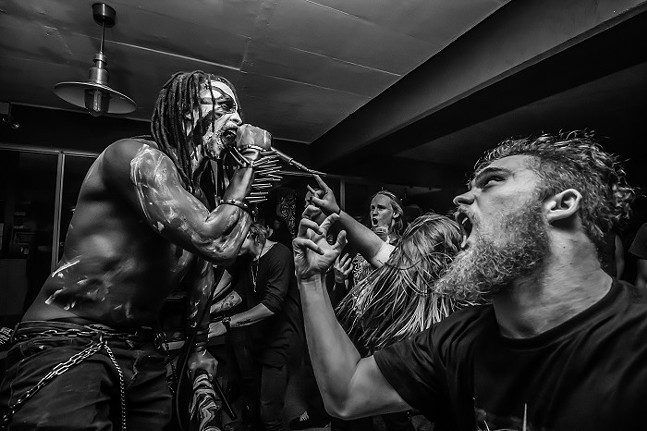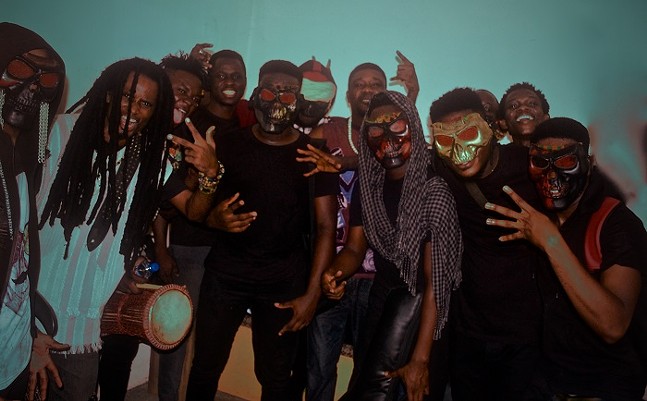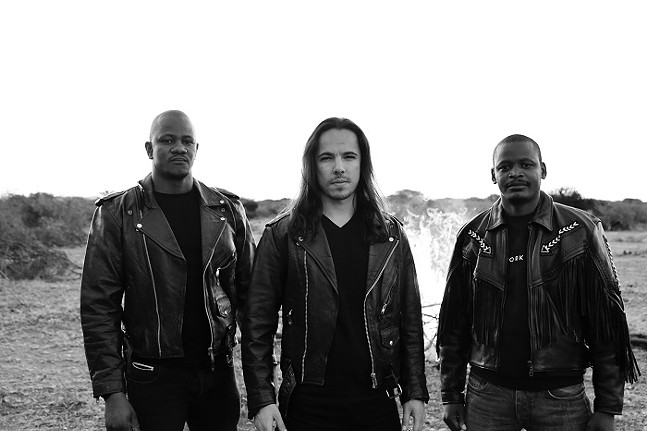
Scream for Me, Africa!, now available through Intellect Press, documents metal bands in countries such as Ghana, Togo, Botswana, and South Africa. Banchs got to know these bands by going to local shows, touring with groups, and even helping out at merch tables.
It helps that Banchs is a lifelong metalhead who played DIY shows in Greensburg, Pa. warehouses during his high school days.
“We could drink beers and listen to Megadeth albums,” Banchs, who lives in Verona, tells Pittsburgh City Paper. “And we kind of shared that scene acumen. I understood the metal culture quite well because I was very much immersed in it.”
The book’s subtitle, Heavy Metal Identities in Post-Colonial Africa, indicates Banchs’ larger political intention this time around: to write about Africa’s metal bands through the lens of colonialism’s lingering effects.
“This [book] was more about what people are actually writing songs about,” Banchs, who holds a Master's degree in African Studies, says. “Instead of asking, you know, ‘What's this song?’ I asked, ‘How has colonialism affected your songwriting, even though you're four or five generations removed from colonialism?’ And they said, ‘No, it's pretty much a part of our lives, and here's how.’”
The author's interest in African metal music after a trip to visit a friend in Zimbabwe in 2007, where he was surprised to hear of several metal acts. Over the next several years, Banchs returned to Africa often, forming connections with the local bands featured in the book.
The book begins in West Africa with the “only heavy metal band in Togo,” according to Banchs, and an anecdote from 2019 about an exhausting nine-hour soundcheck that Banchs witnessed before their show. Called Arka’n Asrafokor, the five-piece band combines Togolese percussion instruments such as the djembe and gankogui with heavy metal riffs, a musical hybridity that uniquely positions them within Togo’s political contexts.
Banchs writes that, by incorporating native music, Arka’n Asrafokor is “reshaping a dialogue around what is possible in heavy metal by performing something beyond ‘Togo-metal’, or ‘African metal’.” Banchs says the band’s long soundcheck, during which malfunctioning equipment forced the band to track down cables, wires, and speakers around the city, epitomizes the lack of physical and digital resources available to many African metal groups.
“In Togo, necessity determines possibilities,” Banchs writes, which, in Arka’n Asrafokor’s case, means making do with knock-off Gibson and Ibanez guitars.
“The ability for bands to promote their music on the internet is different when you have sanctions placed against you,” Banchs says. “Like the bands in Zimbabwe ... they could put their music on Bandcamp, but they can't sell it because PayPal has sanctions against the country, so you can't get paid for your music. You can't upload your music to Spotify until you can and then you hurry up and do it but then, okay, sanctions are back.”
While staying with members of Arka’n Asrafokor in Togo, the father of two of the bandmates initially refused to let Banchs interview his sons out of fear of repercussions. Politics, Banchs learned, was to be broached privately and carefully.
“Well, you don't do the interviews in public, first of all. Second of all, as long as everyone's okay with it, you don't bring it up until it's brought up,” Banchs says. “I wasn't there to talk politics anyway; I was there to document music. But music and politics always have a nasty collision anyway, for better or for worse.”

Kankan Bizin, Dark Suburb’s vocalist, expressed his anger at the unseen reality of Ghana’s poverty, Banchs says.
“People pat themselves on the back for going to Ghana because it's a soft landing. You and I can access things that are very familiar to us in Accra but in reality, the life for most people is the complete opposite,” Banchs explains. “That's what [Kankan] was pissed off about, like, how is this allowed to happen? How in the world would this be allowed to happen, especially in a country that is supposed to be a champion for Africa?”
Although Arka’n Asrafokor and Dark Suburb operate under the radar of most metal fans, the metal scene in Botswana, known as MaRock, is one of the rare examples of an African subculture that has received mainstream Western attention. Photographs in a 2011 Vice article of the leather-clad, cowboy-styled fanbase of bands such as Overthrust and Skinflint captured people’s attention.
Although Banchs gives credit to the photographers for widening the reach of Botswana metal (one such photo appears on the book’s cover), he argues in the book that the methodical documenting of the scene, which, in reality, is quite small, has become an object of fetishization rather than respect.
“I could tell when I would try to interview [photographers]. Jesus Christ, this is just an exotic species for you, isn't it?” Banchs says. “Even metal fans, like, ‘How could this music be so abrasive? Look how gentle these people are.’ Like, we're metalheads! We're not animals.”
Elsewhere in the book, Banchs details the history of Kenya, where the nascent metal music scene is a small but growing means of catharsis after years of authoritarian rule. The annual Nairobi Metal Festival — “an undertaking that many in the local scene would have dismissed in previous years as just a fantasy,” Banchs writes — now helps connect local musicians to professional touring acts. In the face of post-colonialism, blatant censorship, and nine-hour soundchecks, the enduring heavy metal spirit in Africa continues to play.
“Whether in Kansas, Kazakhstan, Katmandu or Kenya, metal fans are united by a common bond, one that ensures heavy metal maintains a thread of dignity, strength and honesty,” Banchs writes.















